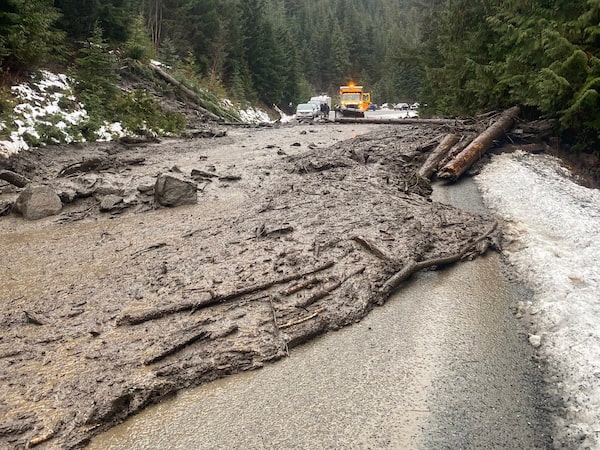
A photo of the mudslide on a stretch of Highway 99 about 280 kilometres north of Vancouver on Nov. 15, 2021. Four people are now confirmed dead and one remains missing after a mudslide near Lillooet, B.C.Charlotte Hall/Supplied
As crews worked around the clock to patch dikes and clear highways following a devastating storm in southern British Columbia, officials announced more confirmed fatalities and the provincial government urged residents to brace for another bout of rough weather.
This past week’s storm, the result of a powerful atmospheric river, caused widespread flooding. It also displaced hundreds of people, damaged major highways and other vital infrastructure and resulted in travel and fuel restrictions for residents.
Shortly after the storm, the RCMP confirmed one fatality in a mudslide near Duffey Lake, south of Lillooet. In a statement Saturday, B.C. chief coroner Lisa Lapointe said that three additional bodies had been found at the site. The total number of confirmed deaths in the slide now stands at four. The fatalities were discovered between Monday and Thursday.
Efforts to locate a fifth person were unsuccessful, Ms. Lapointe said.
How B.C.’s string of natural disasters are connected
And now officials say more rain is on the way. In a bulletin Saturday, the provincial government said Environment and Climate Change Canada has issued weather alerts for heavy rains, strong winds and freezing temperatures for the North Coast, a region that includes Haida Gwaii, Prince Rupert and Kitimat.
The system is expected to reach the South Coast in “a weakened state” by Monday, including regions already saturated by previous flooding.
Abbotsford Mayor Henry Braun told a news conference on Saturday that workers are making good progress on repairing the city’s Sumas Dike, which was damaged in the storm. Hundreds of dump trucks are delivering material, and crews are working around the clock to patch breaches in the dam, he said.
“We believe we are already greater than 50 per cent done on the repairs to the larger breach,” Mr. Braun said, adding that other repairs are expected to be completed before the next weather event.
The Sumas Dike protects a farming area called Sumas Prairie, which suffered extensive flooding as water gushed in from the Nooksack River.
A front-end loader transports members of the Canadian Armed Forces amidst flooded waters as they help move chickens at a farm affected by floods in Abbotsford, B.C., Nov. 20, 2021.POOL/Reuters
Also on Saturday, B.C. Public Safety Minister Mike Farnworth said Environment Canada is working on a new ranking system for atmospheric rivers. The system would provide more information on the expected severity of the weather events.
An atmospheric river is an intense, narrow band of moisture-laden air that brings heat and precipitation from the tropics to the poles.
The one that struck B.C. last Sunday and Monday disgorged record-breaking rainfall. Chicken and cattle died in the deluge and farmers are scrambling to feed and care for those that have survived.
B.C. Agriculture Minister Lana Popham said in a Saturday briefing that the province was able to airdrop four tons of feed to a hog farm, feeding between 4,000 and 5,000 animals.
She said the province has enough feed to sustain livestock for five to six days.
The Trans Mountain oil pipeline remains shut down. The line is owned by the federal government and supplies about 90 per cent of the crude, refined and semi-refined products needed to fuel the Lower Mainland.

A man walks his dog past a flooded church as cleanup continues after flooding in Princeton, B.C., Saturday, Nov. 20, 2021.Jeff McIntosh/The Canadian Press
Trans Mountain Corp. closed the line, which runs to Burnaby, B.C., from Alberta, on Nov. 14.
Heavy rains and fast-moving water swept away earth and exposed parts of the buried pipeline, leaving it vulnerable to further damage from rocks, trees or other debris.
In normal operating conditions, Trans Mountain can use sensor-equipped inspection tools called “smart pigs” to check for gouges, dents or flaws in the pipeline metal, Trans Mountain spokesperson Ali Hounsell said on Saturday.
But with the pipeline shut down, there’s no material moving through the pipes to push the smart pigs along, meaning inspections must be done visually and cross-referenced with maintenance records and information from previous inspections.
Crews that had been working on the Trans Mountain expansion project between Chilliwack and Merritt have been redeployed to work on getting the existing pipeline back into service, Ms. Hounsell said.
More than 200 people are involved in getting the pipeline back up and running. Part of the challenge has been getting access to work sites. Trans Mountain is working with the province to help get roads cleared of storm-related debris.
B.C. declared a state of emergency in response to the floods this past Wednesday.
With a report from The Canadian Press.
We have a weekly Western Canada newsletter written by our B.C. and Alberta bureau chiefs, providing a comprehensive package of the news you need to know about the region and its place in the issues facing Canada. Sign up today.